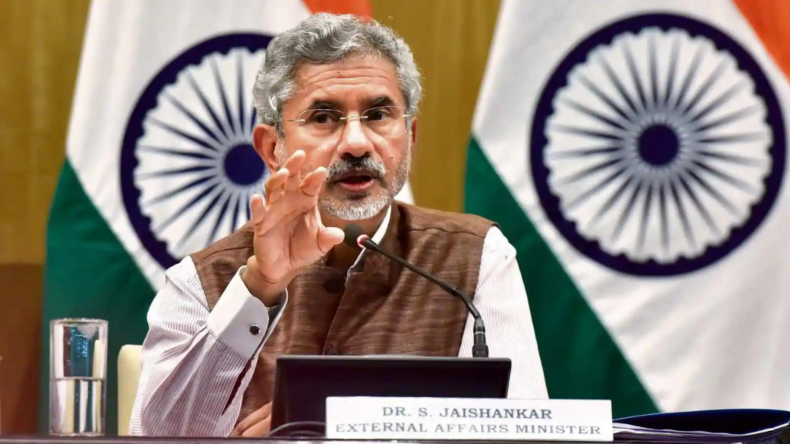On his first visit to Israel, External Affairs Minister S Jaishankar praised the Indian Jewish community for its numerous contributions to the two countries’ centuries-old ties.
External Affairs Minister S Jaishankar said in a speech to the Indian Jewish community and Indologists that India and Israel face similar challenges in their societies from radicalism and terrorism and many other emerging developments on the geopolitical landscape.
On his first visit to Israel as External Affairs Minister, Jaishankar praised the Indian Jewish community for its numerous contributions to centuries-old ties to the two countries.
The minister, who arrived in Israel on Sunday for a five-day official visit, expressed confidence that the Indian Jewish community will bring the two countries closer together in the coming years.
It was my third trip to Israel in the last four years, but every time I return to Japan, I feel an unfinished business.
“Like India, this is a place that will take a lifetime to explore and comprehend.” As a result, I’ll return here and in you, the umbilical cord that feeds these, in a land with centuries of ties. I’m delighted to be there. “Tie,” he said.
According to Jaishankar, bilateral relations between India and Israel have taken a qualitatively different path in recent years.
“Our two countries share democratic and pluralistic values, as well as some of our leading civilizational philosophies.” Vasudhaiva Kutumbakam of India, the world’s One family, Tikun Olam, or world healing, in Israel.
India has detected significant threats from across the Pakistani border, while hostile neighbours also surround Israel. India and Israel have a joint counterterrorism task force, and the two countries share real-time intelligence to deal with what they perceive as a threat.
“The real goal, however,” Dr Jaishankar stated, “is to expand innovation and business partnership between our two knowledge economies.”
He mentioned, for example, how the two countries collaborated to combat the COVID-19 pandemic.
“Can we take it a step further?” How can we improve contacts and collaboration among scientists, students, and start-ups? “During my visit, I will be discussing these and other issues in my meetings,” Dr Jaishankar said.
Dr Jaishankar stated that he had the honour of accompanying Prime Minister Narendra Modi on his historic visit to Israel four years ago, during which he said that India’s relations with his Indian expatriate community in Israel were based on “mutual trust and friendship.”
“Like other communities, it has coexisted peacefully in India for hundreds of years but has maintained its Jewish identity despite long isolation from other Jewish communities,” he said of the Jewish diaspora in India.
“You chose to start a new life here primarily for reasons of civilization.” And it is rare in Jewish history that you have had such a long and continuous period of prosperity in freedom and equality as you did in India,” he said.
Terrorism must be eradicated in India and Israel, according to Israel’s envoy to India.

Dr Jaishankar praised the contribution of Indian Jews to India’s nation-building process, describing them as “one of us,” citing ancient cultural and religious ties between the two civilizations.
The Talmud, the central text of Rabbinic Judaism, mentions trade with India in ginger and iron. The Book of Esther, another important religious text, refers to India as Hodu.
“You have contributed to India’s development. We frequently travel around Mumbai and Pune without realizing that many landmarks, such as the Sassoon Docks in Mumbai and the Sassoon Hospital in Pune, are our creations.
David Sassoon was, in fact, one of the Bank of India’s founders, Dr Jaishankar stated.
“During our freedom struggle, some of you stood by Mahatma Gandhi’s side. David Erulkar, a Jew, was one of the lawyers on the team defending one of our prominent nationalist leaders, Bal Gangadhar Tilak, in 1916.” He went on.
“People my age grew up in India waking up to the sound of All India Radio’s flagship song, which was written by a Jew in exile in India, Walter Kauffman.” And how can you visit India without being influenced by Bollywood and cricket? “You were in our film industry, and one of you, Judah Reuben, was a cricket referee in many test matches in India,” he recalls.
As examples, he cited the mangal sutra and Mehendi, the practice of “baat pukka” for the formalization of marriages among Baghdadi Jews, the symbolic ornamentation of the Torah arches with jasmine garlands, and the use of mantra by Jews of Cochini.
“You’ve also adopted the very Indian custom of removing your shoes before entering the synagogue.” “You remember our way of life, our languages, and our festivals,” he continued.
He discussed India’s historical connection with Jerusalem, which dates back to Sufi Saint Baba Farid meditating in a cave inside the city walls around 1200 CE, the role of Indian soldiers in the region during World War I, and how some of these soldiers also ensured the safety of the Baha’i Faith’s spiritual leader in Israel at the time.
During his visit, the minister would meet with President Isaac Herzog, Prime Minister Naftali Bennett, and Foreign Minister Yair Lapid.
He will also meet with leading academics from all over Israel, business leaders, and members of the Indian Jewish community.













